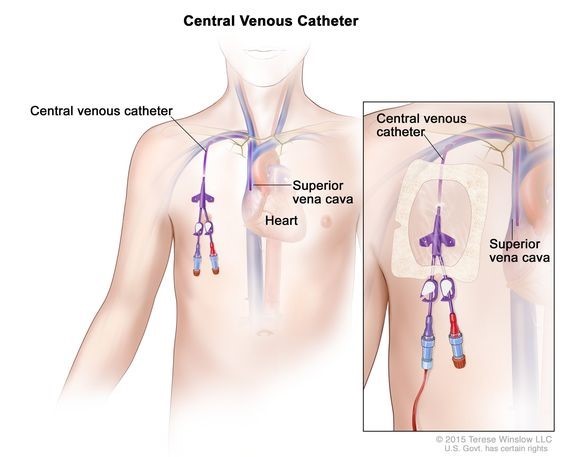A nurse is reviewing the plan of care for a group of clients. The nurse should identify that informed consent is required for which of the following procedures?
Irrigation of a wound with antibiotic solution
Administration of an iron injection using Z-track technique
Placement of a central venous catheter
Insertion of a nasogastric tube
The Correct Answer is C
Informed consent is a legal and ethical requirement for certain medical procedures. It involves providing the client with clear and comprehensive information about the procedure, including its risks, benefits, alternatives, and expected outcomes. The client must understand the information provided and voluntarily give their consent before the procedure can be performed.
Placement of a central venous catheter is an invasive procedure that carries risks and potential complications, making it necessary to obtain informed consent from the client.

Wound irrigation with an antibiotic solution is a standard nursing intervention for wound care and does not usually involve invasive procedures. Informed consent is not typically required for this procedure.
The administration of an iron injection using the Z-track technique is a standard nursing procedure. While it involves an injection, it is not typically considered an invasive procedure that would require informed consent.
Insertion of a nasogastric tube is a common procedure that involves passing a tube through the nose and into the stomach for various purposes, such as feeding, decompression, or medication administration. While it is an invasive procedure, it is often performed in emergency or critical care situations where the client's immediate well-being takes precedence. Informed consent may not be feasible or necessary in these situations, depending on the context and urgency.
Nursing Test Bank
Naxlex Comprehensive Predictor Exams
Related Questions
Correct Answer is C
Explanation
Explanation
C.I should check my heart rate while taking the medication
Timolol is a medication commonly prescribed for the treatment of primary open-angle glaucoma, which is a chronic eye condition characterized by increased intraocular pressure
hacking the heart rate while taking timolol eye drops is important. Timolol belongs to a class of medications called beta-blockers, which can have systemic effects. These medications can enter the bloodstream and potentially affect heart rate and blood pressure. Monitoring the heart rate can help assess for any potential adverse effects of the medication.
Taking a zinc supplement in (option A) is not correct because it is not typically necessary while taking timolol eye drops. Zinc supplementation is not a direct requirement or related to the use of timolol for glaucoma treatment. The client should follow their healthcare provider's instructions regarding medication use and potential dietary modifications, but zinc supplementation is not specifically associated with timolol.
Timolol eye drops in (option B) is not correct because it does not darken the colour of the eyes. The purpose of timolol eye drops is to reduce intraocular pressure by decreasing the production of fluid in the eye. Eye colour changes are not known effects of timolol eye drops.
Timolol eye drops in (option D) is incorrect because it does not dilate the eyes. In fact, they work by reducing intraocular pressure, not by dilating the eyes. Eye dilation is typically achieved with the use of specific eye drops called mydriatics or with the use of specialized ophthalmic instruments during an eye examination.
Correct Answer is D
Explanation
Montelukast is a medication commonly used for the maintenance treatment of asthma. It is not used for immediate relief of wheezing or acute symptoms. Instead, it is taken on a scheduled basis to help control and prevent asthma symptoms over time. The recommended dosing regimen for montelukast in children is once daily in the evening.
The statement about giving the medication every 2 hours if the child is wheezing is incorrect, as this medication is not meant to be used for immediate relief of symptoms. It is a preventive medication.
The statement about it taking 2 months of scheduled use before the medication is effective is incorrect. While it may take some time for the medication to reach its full effect, improvement in symptoms can often be seen within a few days to weeks of starting treatment.
The statement about stopping the medication if the child is taking a steroid is incorrect. Montelukast can be used in conjunction with other asthma medications, including steroids, as prescribed by the healthcare provider. It is important to follow the prescribed treatment plan and not discontinue any medication without consulting the healthcare provider.
Whether you are a student looking to ace your exams or a practicing nurse seeking to enhance your expertise , our nursing education contents will empower you with the confidence and competence to make a difference in the lives of patients and become a respected leader in the healthcare field.
Visit Naxlex, invest in your future and unlock endless possibilities with our unparalleled nursing education contents today
Report Wrong Answer on the Current Question
Do you disagree with the answer? If yes, what is your expected answer? Explain.
Kindly be descriptive with the issue you are facing.
